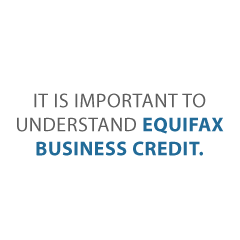Business credit is just one of many factors that affects the Fundability™ of your business. Your Equifax business credit score, your D&B business credit score, your Experian business credit score, and any other agency your lender may pull a credit score from all have a huge impact on your ability to get funding for your business.
They might use reports from any of these agencies or a combination. Since you can’t know which reports they will look at, you have to understand each one. You need to know what information it gives them and where that information comes from. It is important to understand Equifax business credit.
How Equifax Business Credit Can Affect the Overall Fundability™ of Your Business
In order to build and maintain strong Fundability™, you need to understand everything you can about the reports from each of the big three credit reporting agencies, and what they tell lenders about your business.
Equifax Business Credit Reports
Equifax collects information similar to Dun and Bradstreet, including data from the following sources.
- information from public records
- financial data from the business
- payment history from creditors
- Credit utilization is also a factor, which accounts for how much credit you are using versus the amount of credit you have available to use.
The information is used to calculate various scores, including the business credit risk score and the business failure score. The first measures how likely it is that a business will become 90 days or more delinquent on bills over the next year. It ranges from 101 to 992.
The second, ranges from 1,000 to 1610. Likewise, it predicts how likely it is that the business will file for bankruptcy over the next 12-month period. A lower score indicates higher risk.
They also calculate what they call the business payment index. This is the Equifax version of the Dun & Bradstreet PAYDEX. It even runs on the same scale of 0 to 100. It’s an indicator of payment history over the past year. In contrast to the PAYDEX however, you must reach a score of 90 or higher for it to be a good score.
In addition, Equifax offers business identity reports to confirm a company actually exists. It verifies details such as the company’s tax ID, number of employees, and yearly sales.
Equifax does not allow business owners to request a file be opened for their own company. They decide themselves when to start a credit file on a specific company.
Financial and trade data are combined, and they add in utility and telephone payment data. Public records are also a source of information.
Equifax Business credit scores include:
The Small Business Credit Risk Score for Suppliers
It is scored on a scale of 1 to 100, with 90+ indicating that a business has paid its obligations as agreed. An 80 to 89 means they are 1 to 30 days past due, 60 to 79 indicates they are 31-60 days overdue, 40 to 59 is 61 to 90 days past the payment date. It just goes down from there.
Business Failure Risk Score
This score indicates the chance of a company paying its bills late on the following scale:
- 497 – 816: 25% or less chance of payment being overdue
- 452 – 496: 26 – 50% chance of payment going overdue
- 415 – 451: 51 – 74% chance of delinquent payments
- 101 – 414: 75 – 100% chance of delinquent payments
Public Records Report
The purpose of this report is to list bankruptcies, judgments, and liens along with the amount, date of the most recent filing, and how they were satisfied.
Credit Usage Report
This a pie chart that shows your company’s credit usage. It gives a visual of what percent of your available credit you are using. That is known as your credit utilization ratio, and it has a pretty big impact on your overall credit score.
Credit Report Summary
The summary report shows the number of your business’s credit accounts, as well as the date each one became active. It also lists any amounts past due, along with your most severe status of the past 24 months.
The highest amount of credit extended, the median balance, and the average open balance are included as well.
Additionally, the report lists recent activity such as number of new accounts opened recently, delinquent accounts, number of updated accounts, and inquiries.
Financial Account Highlights
This report shows details for the past 36 months, including credit accounts and leases. It lists the status, open and close date, original and current credit limits, and any past due amount for each. In addition, the payment amount and frequency for each account, as well as whether or not it is secured are also noted.
Does Equifax Business Credit Really Matter?
Yes, all business credit matters! Why do you need separate business credit? Here’s why. According to Inc.com, small business owners who understand their business credit scores are 41% more likely to get approval when they apply for a business loan. You can’t understand it if you don’t have it. Right?
Also, if the unthinkable happens and your personal credit tanks, you need to be able to continue to run and grow your business. If your business credit is strong, you can still do that no matter what is happening with your personal credit.
It’s true, a new business will not have any business credit. However, it doesn’t have to stay that way. Building business credit is important, so that when the time comes, you can keep your personal credit separate and finance business growth using your business credit.
How Can I Improve my Equifax Business Credit?
What if your Equifax business credit isn’t so great? Here are some simple things you can do to boost it.
Add New Trade Lines
Don’t pay for them. There is no proof that buying tradelines actually helps. If you do things the right way, it happens for free and it for sure works. There are a few ways to get it done.
First, you can ask the vendors you already work with about starting a credit relationship. Ask if they will extend you credit based on the merits of the business relationship. Then, ask if they will report the payments. Even if you only get one or two reporting, your credit score will increase with every on-time payment recorded.
Next, you can ask utilities, telephone companies, and internet companies to report the payments you already make to them on a regular basis. They don’t have to do it, but there is no harm in asking and it is an easy way to get more accounts reporting without actually opening new accounts.
Lastly, if you have a poor credit score, you can work with starter vendors in the vendor credit tier. These are retailers that sell things you use everyday in your business anyway. Often, they will extend net terms on invoices without a credit check and report your payment to the credit agencies.
Ask to Delete Paid off Collections
Did you know that if you have an account that goes to collections, it will stay on your credit report even after you pay it off? That’s right. The negative hit stays on your report even if you pay off the account in full. However, you can ask that they remove it.
Ensure All Information is Correct and Up to Date
Take the initiative to notify credit agencies of changes in address, phone number, email addresses, etc. In addition, monitor your business credit reports so you can dispute any mistakes.
Update the details if there are errors or the information is incomplete. Do this for Equifax here: www.equifax.com/business/small-business.
Ask for An Increase to Your Credit Limit
Your credit utilization ratio is the amount of debt you have in relation to the amount of credit you have available to you. If you are using a ton of your available credit, your ratio will be high, and vice versa. When people ask themselves how to increase business credit, they often realize this. The next step, for most, is to add accounts to increase the amount of credit available.
However, this isn’t always the best option because the average age of all reporting accounts affects your credit score as well. If you are adding new accounts, that average age decreases, which negatively affects your account.
Another option, which works much better, is to ask your current accounts to raise your credit limit. This way, you have more available credit, decrease your credit utilization ratio, and leave your average age of accounts unaffected.
Make Payments on Time!
The number one way to increase Equifax business credit is to make consistent, on-time payments. Here’s a bonus tip too. If you find that you need to stop carrying so many balances and have the means to pay a little extra on minimums, pick the balance with the highest interest rate and put all of your extra onto that balance.
Once it is paid off, take the total payment amount and pay that amount extra on the balance with the next highest interest rate. This will create a sort of snowball effect. As you see your balances getting paid down, you will see your business credit score increase. You’ll save money on interest also, since you are paying off the highest interest rate balance first.
Monitor Your Business Credit Regularly
It’s important to monitor your Equifax business credit to know which accounts are reporting, which are not, and to catch any mistakes that may pop up. Because you will catch mistakes faster, this could help you build business credit faster.
You can purchase reports directly from Equifax. Unfortunately, you can’t get a Equifax business credit report like you can a personal credit report.
The only real way to get a free copy of your credit report is if you are denied a loan based on your business credit. Of course, this is not a fun way to see your business credit reports for free. After denial, you will receive a letter in the mail from the agency that provided the lender with your report.
You will have the opportunity to request a free copy of the report that the lender saw, so that you can see why the result was denial. You have 90 days to submit your request. Note that if your lender did not use Equifax, you will not be getting a copy of your Equifax report.
Other than being denied for a business loan, here are a few other hacks to get you at least a sneak peek of your business credit.
Nav
Nav is a service that will let you see a summary of your credit reports from all three of the major credit reporting agencies. However, these are only summaries, not full reports. Generally, that means you can see your score, and maybe the accounts you have listed.
While this will help you see where you stand, it will not suffice for the purpose of correcting mistakes or even to show you what you need to do to improve your score. You do have the option to pay for more information though.
Credit.net
Credit.net does not offer ongoing free business credit reports. However, you can get a free trial. There is no credit card requirement either. After you pull the report, you have 30 days to check it out. This means at least once you can get a totally free look at your report, because there is no fear of missing a cancelation deadline and having to pay anyway.
Scorely
This is a lesser known credit reporting agency that will let you see your credit report for free before you pay for an ongoing subscription. Unlike Nav or Credit.net, they are actually calculating their own score similar to the big 3 (Experian, Equifax, and Dun & Bradstreet.) They strive to be totally transparent and to make their reports easy to understand.
Seeing your Scorely report will give you an idea of where you stand, but it will not help you know exactly what your Equifax business credit report says.
Your Equifax Business Credit Can Have a Huge Impact on Fundability™
Really, all business credit definitely has a huge impact on Fundability™. I mean, in truth your scores from all of the big three should be similar because they are pulling information from the same general sources.
They will likely not be exact however, and there is no way to know which one a lender may pull.
That is why it is important to understand each one and how they impact Fundability™. Remember though, there are lots of factors that affect Fundability™. Even if your business credit score is stellar, you could still run into issues. You need to take the whole picture into account.


